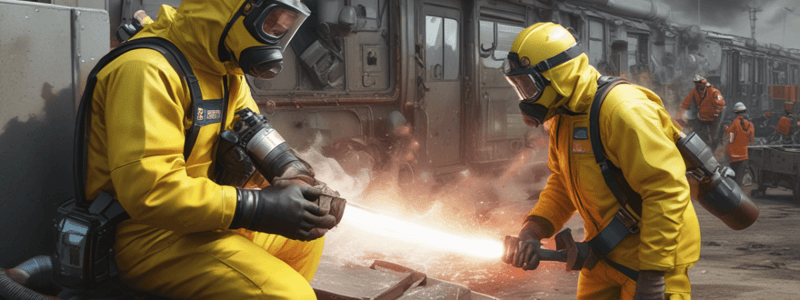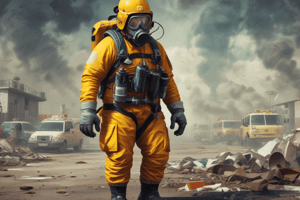Podcast
Questions and Answers
What is the primary purpose of a Safety Alert?
What is the primary purpose of a Safety Alert?
- To notify personnel of an extraordinary hazard (correct)
- To provide updates on operational procedures
- To inform personnel of equipment malfunctions
- To announce tactical changes during an incident
Which of the following scenarios does NOT require a Safety Alert?
Which of the following scenarios does NOT require a Safety Alert?
- Open elevator shaft
- A minor hazard detected (correct)
- Live power lines down
- Potential for personnel injury or death
Who must be informed of an extraordinary hazard on the fireground?
Who must be informed of an extraordinary hazard on the fireground?
- Only the Incident Commander
- Emergency dispatch personnel
- Civilian bystanders in the area
- All on-scene personnel (correct)
What characterizes the Safety Alert tone?
What characterizes the Safety Alert tone?
What responsibility does the Incident Commander have after identifying an extraordinary hazard?
What responsibility does the Incident Commander have after identifying an extraordinary hazard?
What action must be taken when the FAO broadcasts "CLEAR THE RADIO FOR EMERGENCY TRAFFIC"?
What action must be taken when the FAO broadcasts "CLEAR THE RADIO FOR EMERGENCY TRAFFIC"?
In what situation should personnel re-evaluate their tactics?
In what situation should personnel re-evaluate their tactics?
How should a Safety Alert be communicated once issued?
How should a Safety Alert be communicated once issued?
Which of the following is NOT a reason to call for a Safety Alert?
Which of the following is NOT a reason to call for a Safety Alert?
What is the role of the Incident Safety Officer in relation to extraordinary hazards?
What is the role of the Incident Safety Officer in relation to extraordinary hazards?
Flashcards are hidden until you start studying
Study Notes
Hazard Identification and Communication
- TFD personnel must constantly evaluate risks vs. benefits of tactics during emergency operations
- When encountering an extraordinary hazard, members should re-evaluate risks and formulate a safety plan for the worst-case scenario
- Members should consider how the hazard will impact their goals and whether they need to change tactics or methods
- They should ask how the hazard will affect their safety, their crew's safety, and all other personnel on the scene
Safety Alert Notification
- A Safety Alert is an announcement with a unique tone to notify personnel of an extraordinary hazard
- The tone is a solid 3-5 second tone repeated twice
- The Safety Alert is used to inform all personnel that an extraordinary hazard exists, but operations may continue
- The Incident Commander (IC) is responsible for informing all affected personnel of the hazard
When to Call a Safety Alert
- Live power lines down
- Holes in the floor
- Open elevator shaft
- Ferocious dog loose in the area
- Unusual situation or unique event
- Potential for personnel injury or death
- Sudden change in conditions that create an imminent danger to members
Broadcasting a Safety Alert
- The IC or designee contacts FAO ("Main") via the designated incident tactical channel or cellular phone open line
- FAO ("Main") broadcasts "CLEAR THE RADIO FOR EMERGENCY TRAFFIC" followed by the Safety Alert Tone
- FAO ("Main") announces critical information, such as evacuation instructions or hazard warnings, using clear text
Studying That Suits You
Use AI to generate personalized quizzes and flashcards to suit your learning preferences.



